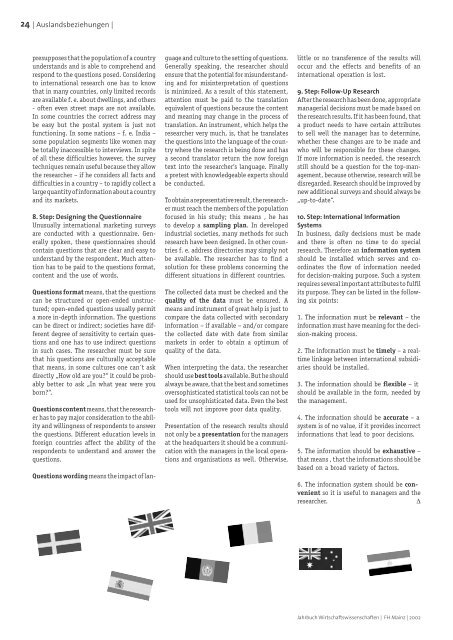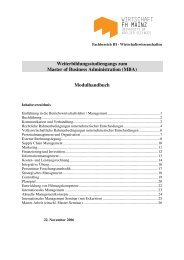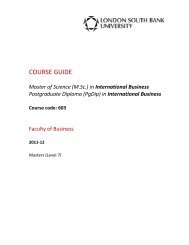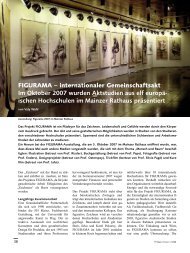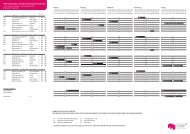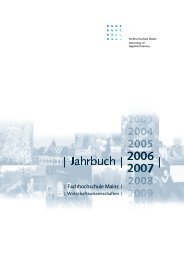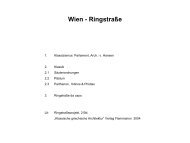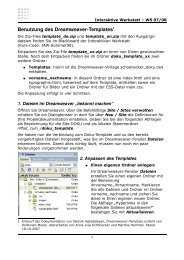Fachhochschule Mainz University of Applied Sciences
Fachhochschule Mainz University of Applied Sciences
Fachhochschule Mainz University of Applied Sciences
Erfolgreiche ePaper selbst erstellen
Machen Sie aus Ihren PDF Publikationen ein blätterbares Flipbook mit unserer einzigartigen Google optimierten e-Paper Software.
24 | Auslandsbeziehungen |<br />
presupposes that the population <strong>of</strong> a country<br />
understands and is able to comprehend and<br />
respond to the questions posed. Considering<br />
to international research one has to know<br />
that in many countries, only limited records<br />
are available f. e. about dwellings, and others<br />
- <strong>of</strong>ten even street maps are not available.<br />
In some countries the correct address may<br />
be easy but the postal system is just not<br />
functioning. In some nations – f. e. India –<br />
some population segments like women may<br />
be totally inaccessible to interviews. In spite<br />
<strong>of</strong> all these difficulties however, the survey<br />
techniques remain useful because they allow<br />
the researcher – if he considers all facts and<br />
difficulties in a country – to rapidly collect a<br />
large quantity <strong>of</strong> information about a country<br />
and its markets.<br />
8. Step: Designing the Questionnaire<br />
Unusually international marketing surveys<br />
are conducted with a questionnaire. Generally<br />
spoken, these questionnaires should<br />
contain questions that are clear and easy to<br />
understand by the respondent. Much attention<br />
has to be paid to the questions format,<br />
content and the use <strong>of</strong> words.<br />
Questions format means, that the questions<br />
can be structured or open-ended unstructured;<br />
open-ended questions usually permit<br />
a more in-depth information. The questions<br />
can be direct or indirect; societies have different<br />
degree <strong>of</strong> sensitivity to certain questions<br />
and one has to use indirect questions<br />
in such cases. The researcher must be sure<br />
that his questions are culturally acceptable<br />
that means, in some cultures one can´t ask<br />
directly „How old are you?“ it could be probably<br />
better to ask „In what year were you<br />
born?“.<br />
Questions content means, that the researcher<br />
has to pay major consideration to the ability<br />
and willingness <strong>of</strong> respondents to answer<br />
the questions. Different education levels in<br />
foreign countries affect the ability <strong>of</strong> the<br />
respondents to understand and answer the<br />
questions.<br />
Questions wording means the impact <strong>of</strong> lan-<br />
guage and culture to the setting <strong>of</strong> questions.<br />
Generally speaking, the researcher should<br />
ensure that the potential for misunderstanding<br />
and for misinterpretation <strong>of</strong> questions<br />
is minimized. As a result <strong>of</strong> this statement,<br />
attention must be paid to the translation<br />
equivalent <strong>of</strong> questions because the content<br />
and meaning may change in the process <strong>of</strong><br />
translation. An instrument, which helps the<br />
researcher very much, is, that he translates<br />
the questions into the language <strong>of</strong> the country<br />
where the research is being done and has<br />
a second translator return the now foreign<br />
text into the researcher‘s language. Finally<br />
a pretest with knowledgeable experts should<br />
be conducted.<br />
To obtain a representative result, the researcher<br />
must reach the members <strong>of</strong> the population<br />
focused in his study; this means , he has<br />
to develop a sampling plan. In developed<br />
industrial societies, many methods for such<br />
research have been designed. In other countries<br />
f. e. address directories may simply not<br />
be available. The researcher has to find a<br />
solution for these problems concerning the<br />
different situations in different countries.<br />
The collected data must be checked and the<br />
quality <strong>of</strong> the data must be ensured. A<br />
means and instrument <strong>of</strong> great help is just to<br />
compare the data collected with secondary<br />
information – if available – and/or compare<br />
the collected date with date from similar<br />
markets in order to obtain a optimum <strong>of</strong><br />
quality <strong>of</strong> the data.<br />
When interpreting the data, the researcher<br />
should use best tools available. But he should<br />
always be aware, that the best and sometimes<br />
oversophisticated statistical tools can not be<br />
used for unsophisticated data. Even the best<br />
tools will not improve poor data quality.<br />
Presentation <strong>of</strong> the research results should<br />
not only be a presentation for the managers<br />
at the headquarters it should be a communication<br />
with the managers in the local operations<br />
and organisations as well. Otherwise,<br />
little or no transference <strong>of</strong> the results will<br />
occur and the effects and benefits <strong>of</strong> an<br />
international operation is lost.<br />
9. Step: Follow-Up Research<br />
After the research has been done, appropriate<br />
managerial decisions must be made based on<br />
the research results. If it has been found, that<br />
a product needs to have certain attributes<br />
to sell well the manager has to determine,<br />
whether these changes are to be made and<br />
who will be responsible for these changes.<br />
If more information is needed, the research<br />
still should be a question for the top-management,<br />
because otherwise, research will be<br />
disregarded. Research should be improved by<br />
new additional surveys and should always be<br />
„up-to-date“.<br />
10. Step: International Information<br />
Systems<br />
In business, daily decisions must be made<br />
and there is <strong>of</strong>ten no time to do special<br />
research. Therefore an information system<br />
should be installed which serves and coordinates<br />
the flow <strong>of</strong> information needed<br />
for decision-making purpose. Such a system<br />
requires several important attributes to fulfil<br />
its purpose. They can be listed in the following<br />
six points:<br />
1. The information must be relevant – the<br />
information must have meaning for the decision-making<br />
process.<br />
2. The information must be timely – a realtime<br />
linkage between international subsidiaries<br />
should be installed.<br />
3. The information should be flexible – it<br />
should be available in the form, needed by<br />
the management.<br />
4. The information should be accurate – a<br />
system is <strong>of</strong> no value, if it provides incorrect<br />
informations that lead to poor decisions.<br />
5. The information should be exhaustive –<br />
that means , that the informations should be<br />
based on a broad variety <strong>of</strong> factors.<br />
6. The information system should be convenient<br />
so it is useful to managers and the<br />
researcher. Δ<br />
Jahrbuch Wirtschaftswissenschaften | FH <strong>Mainz</strong> | 2002


